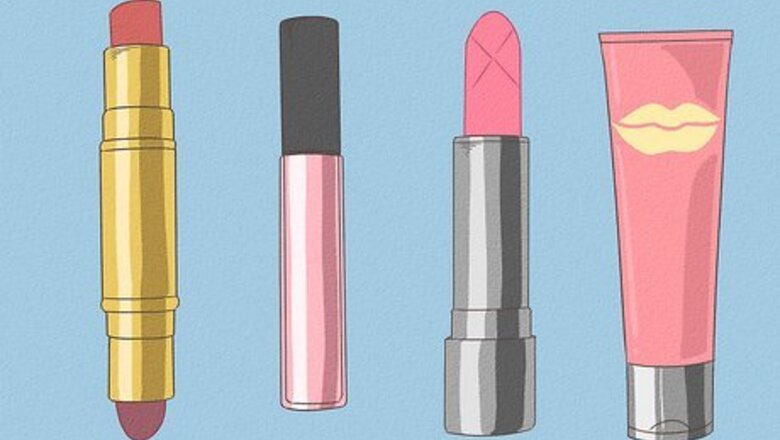
views
Using Lip-plumping Products
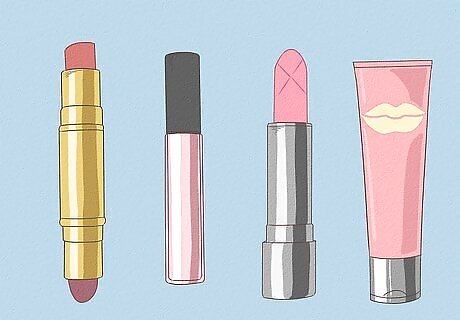
Invest in a lip-plumping product. Lip-plumping products come in many forms: glosses, balms, sticks, gels, and pots. Applying these to your lips can temporarily make your lips look fuller, often by irritating them. The plumping effect will only last for a couple of hours, but you can renew it by reapplying the product to your lips. Note that the effects won’t be as drastic as those achieved through cosmetic surgery.
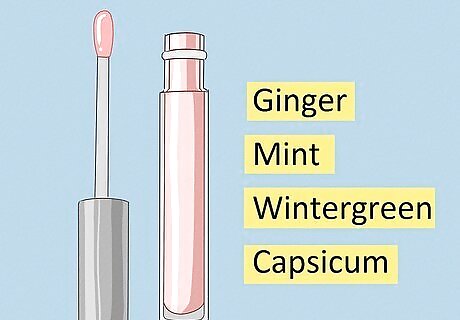
Know which lip-plumping ingredients to look for. Ingredients like cinnamon, ginger, mint, wintergreen, and capsicum will boost blood flow to your lips, causing them to redden and swell — i.e., to look fuller.
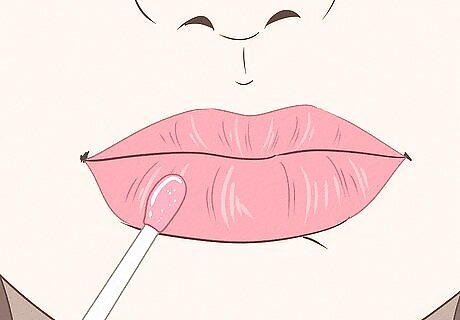
Use a lip plumper as a primer. If you wish to combine your lip-plumping product with a lipstick or gloss, apply the plumper to your lips first for maximum effectiveness.
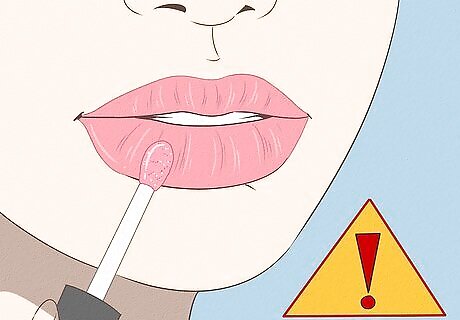
Don’t overuse lip plumpers. Dermatologists recommend against overusing lip-plumping products, as these may cause your lips to become dry and scaly. Try to save the lip plumpers for special occasions.
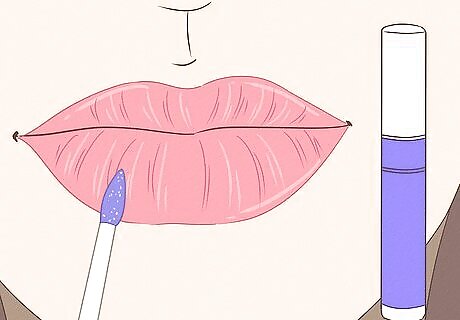
Look into treatment plumpers. If you want more from your lip-plumping products, consider trying a treatment plumper. Manufacturers claim that treatment plumpers can stimulate your lips into producing more collagen and elastin, making your lips fuller for a longer period of time. Treatment plumpers are available for purchase online and in person at shops that carry beauty products. They may be more expensive than traditional plumpers. Common ingredients in treatment plumpers include peptides, marine collagen, and human growth factors.
Creating the Illusion of Bigger Lips with Makeup
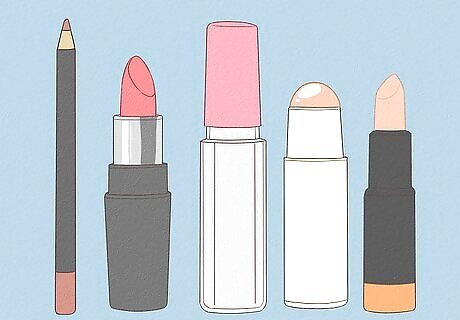
Gather your materials. To make your lips look bigger using makeup you’ll need a lipliner or lip crayon; a lipstick or lip crayon that is the same color as the lipliner, but a shade lighter; a lip gloss; a highlighting balm or powder; and a lip exfoliator (a toothbrush will do). For a more natural look, use two nude shades of lipliner and lipstick; for a more dramatic look, use vibrant reds or pinks. Dramatic colors will immediately make your lips look fuller and more prominent. Some makeup manufacturers sell double-sided lip crayons in complementary shades of the same color. These are great options. You may find that matte lipsticks and crayons are easier to work with, particularly when going for a naturally bigger lip.
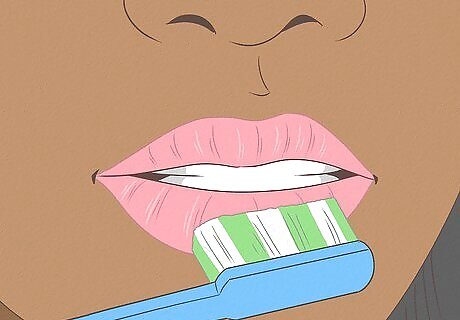
Exfoliate your lips. Using a soft-bristled toothbrush, spend approximately 20 seconds gently massaging the dead skin off your lips. This will cause your lips to swell up a bit; it may also cause them to feel dry. You can also exfoliate your lips with a damp washcloth or sugar. Some dermatologists advise against exfoliating one’s lips, as this can cause them to become dry and chapped over time. Exfoliating your lips is fine to do once in a while if your lips are flakey and you need to wear lipstick (for example, if you’re going somewhere formal); just avoid it whenever you can!
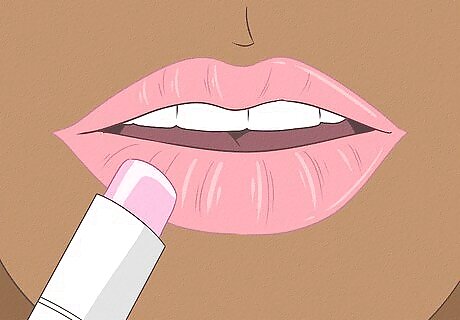
Apply a moisturizing lip balm to your lips. Any balm will do: just be sure to avoid waxes or anything too heavy, which will not moisturize your lips, but only seal in existing moisture. Be sure that you’ve saturated your lips with the balm, and that you let it sit for a couple of minutes before applying the liner.
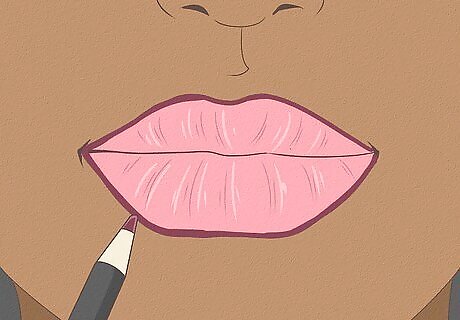
Line your lips with the darker colored lip pencil. Lining your lips is a great way to make your lips look larger. To keep it looking natural, line the outer edges, or just outside of the outer edges, of your lips. Don’t go too far outside the natural lines of your lips otherwise you may look like a clown!
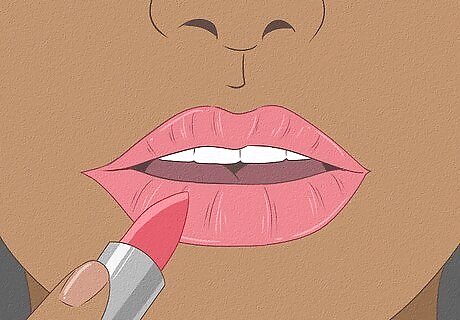
Fill in your lips. Use the darker pencil to fill in the corners of your lips, and the lighter shade of lipstick/crayon to fill in the middle part of your upper and lower lips. Some people recommend filling in your entire lips with a lip pencil to create an even base. Experiment with different ways of lining your lips to see what you like best!
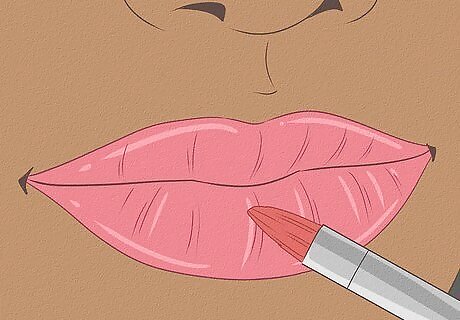
Blend the light and dark colors together. You don’t want an unattractive border around your lips. Blend everything together so that it looks more natural. You can do this with your finger, a cotton swab, or a lip brush.
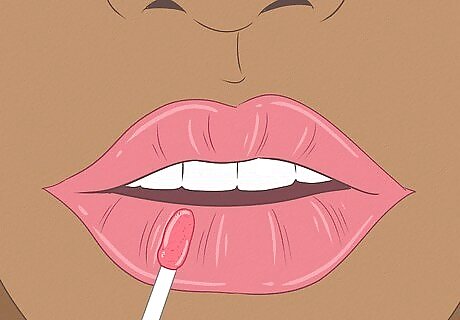
Apply a lip gloss over your entire lips. You can use a clear gloss or a gloss in the same color range of the color you’ve put on your lips.
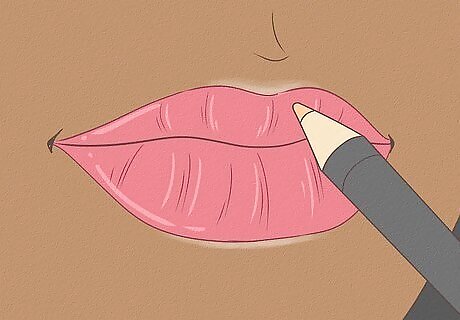
Apply a small amount of highlighter on the middle of your upper and lower lips. Place a small amount of highlighting cream, balm, or powder on your finger and dab it lightly on to the middle of your upper and lower lips. A shimmery eyeshadow will also work as a highlighter. After dabbing the highlighter on to your lips, rub your finger lightly over the dabs so that they’re nicely blended.
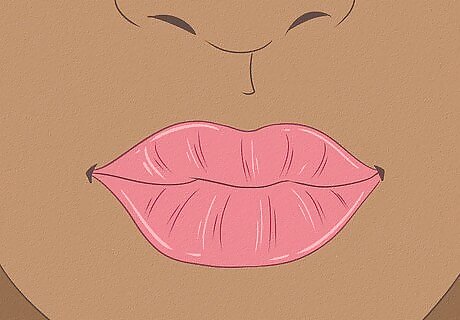
Enjoy your plump pout!
Taking Care of Your Lips
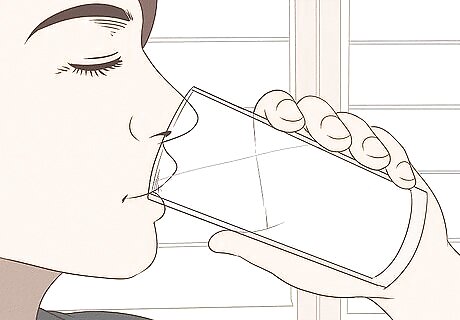
Drink enough water. When your lips are dry and chapped, they will appear thinner. You can make your lips appear plumper and healthier simply by taking better care of them; the first step to doing this is to drink enough water. A popular method for calculating how much water you should drink each day is to take your weight in pounds and divide it in half; the result is how many ounces of water you should drink each day.

You would need to drink more water if you lived in a hot climate or exercised — in other words, if you were sweating more than normal. A 150-pound woman should drink roughly 75 ounces (about 2,200 ml) of water each day.
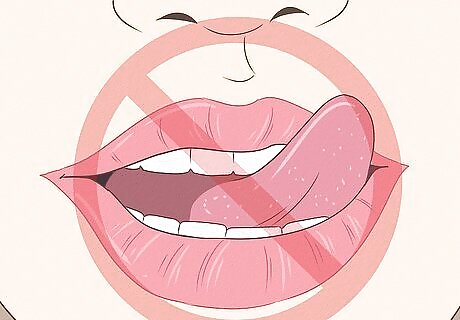
Don’t lick your lips. When you lick your lips, your tongue spreads acidic saliva on them. This can remove your lips’ natural oils and cause them to become irritated.
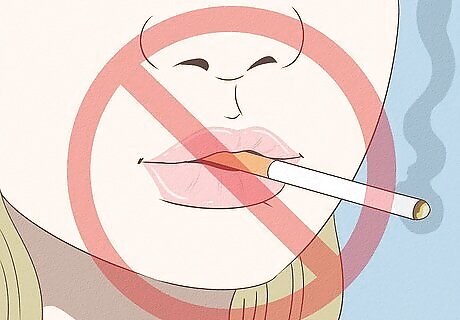
Don't smoke. Smoking can irritate and discolor your lips; it can also cause wrinkles around your mouth. If you smoke and do not want to quit, at the very least try switching to an e-cigarette, which will not be as toxic to your lips as a regular cigarette. You may be able to reduce smoking-related discoloration by massaging almond and coconut oil on your lips each day.
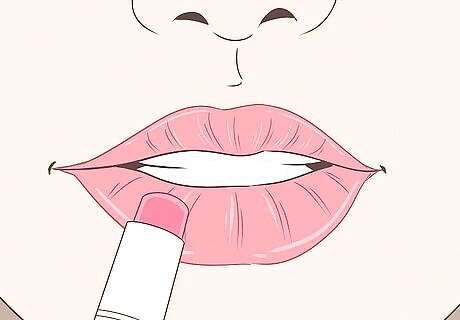
Apply a moisturizing balm to your lips. If your lips are dry or chapped, use a lip balm regularly. Even if your lips are not chapped, consider using a lip moisturizer that contains an SPF to protect your lips from the sun’s damaging rays. If your lips are sensitive, it may take some trial and error to find a lip balm that works for you. Some people use natural balms containing ingredients like coconut oil and honey, while others find that medicated balms containing menthol are best. Unless your lips are already well-hydrated, avoid beeswax lip balms. Beeswax lip balms are too heavy to actually impart moisture to your lips; they can only seal in the moisture that’s already there.
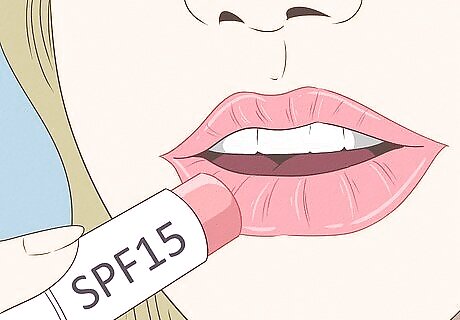
Wear SPF on your lips. If you only put one thing on your lips, it should be SPF. The sun’s rays can cause your lips to chap and become dry, making them look smaller than they are. Shiny products such as lip glosses can actually magnify the sun’s rays, causing them to harm your lips more than if you had nothing on your lips at all. Dermatologists warn that wearing lip gloss without an SPF can do more than damage your lips: it can actually cause skin cancer.
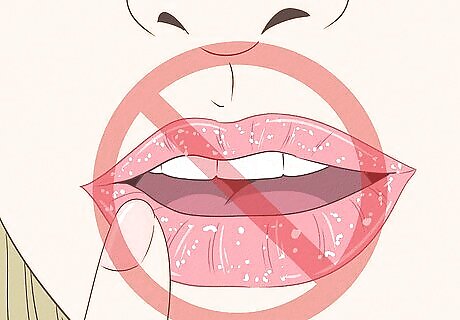
Don’t exfoliate your lips. Exfoliating your lips might help them feel smooth in the short term, but it can actually damage your lips if you do it regularly. Instead of exfoliating your lips, work on keeping them hydrated. Unlike your regular skin, your lips are made of a sensitive mucous membrane. When this membrane is healthy, it’s naturally smooth.
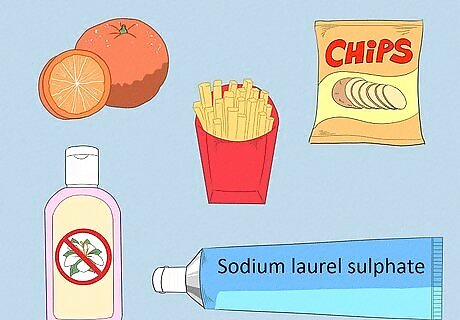
Avoid products that may cause allergic reactions. If you are taking good care of your lips and they are still always chapped, you may be experiencing an allergic reaction to something you’re using on or near your lips: Citrusy and salty foods can irritate lips. Some toothpastes can irritate lips. If you think your toothpaste may be causing problems for you, try switching to one that doesn’t contain sodium laurel sulphate or alcohol. Be mindful of heavily scented facial products, which can wind up on your lips and can cause irritation.
Exercising Your Lips
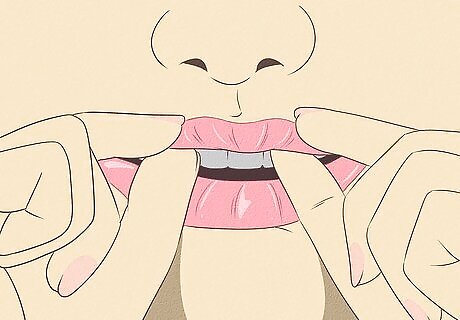
Commit to exercising your lips every day. It may take up to 4 weeks for you to see a difference, so be prepared to wait for results. You may find it useful to take a “before” pic: tracking your progress might help keep you motivated. Aim for at least a few minutes of lip exercises 1 to 2 times per day. You can pick and choose from the exercises in this article, or do an online search for more exercises. There are many instructional videos on lip-plumping exercises, if you’d like someone to follow along with. While many people swear they’ve seen a difference, there is insufficient scientific research to suggest that lip exercises actually work.
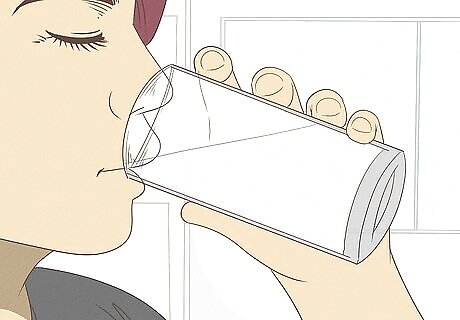
Ensure that your lips are well-hydrated. Doing lip exercises with dry, chapped lips, will likely cause them to tear and/or bleed. If your lips are quite chapped, drink lots of water and apply a good lip moisturizer, then wait a few days until they’re in better shape before starting lip exercises.
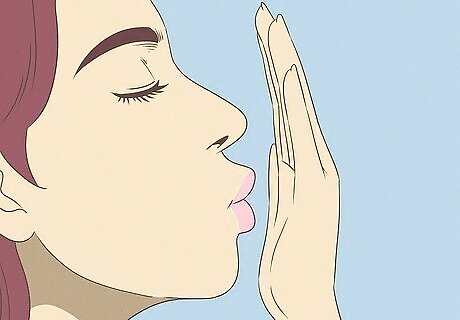
Blow a kiss. Holding your hand close to your face, press your lips against it as if you’re about to blow someone a kiss. Hold your lips against your hand for several seconds. Repeat 5 to 10 times.
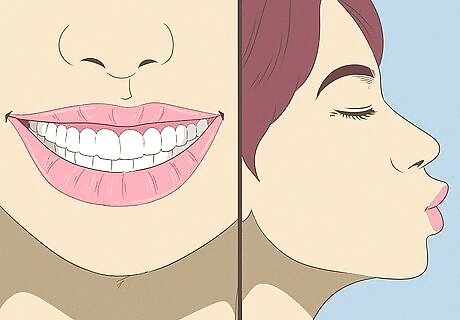
Smile and kiss 5 times. Sitting upright with your mouth closed, smile as broadly as you can. Do this for 15 seconds, then relax. Next, pucker your lips, pushing them out as far as you can into an exaggerated kissy face. Do this 10 times. After smiling and puckering your lips, hold the puckered position for at least 30 seconds, then relax and pull your lips inside your mouth, letting your teeth gently clamp down on them. Hold this position for 10 seconds. Repeat the whole process 5 times.
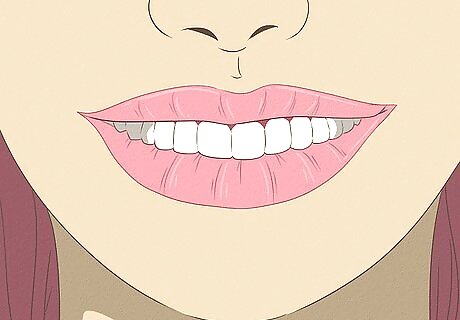
Smile with your lips folded inward. Fold your lips inward over your teeth, then lift the corners of your mouth into a smile. Hold this position for at least 10 seconds. Repeat 10 times.
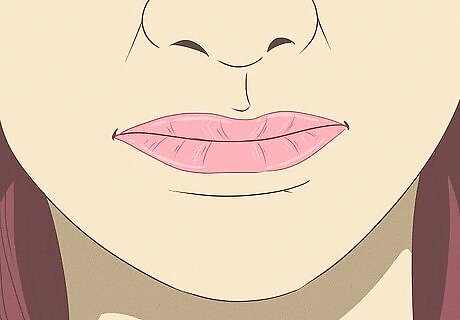
Do 10 lip presses. Press your lips together into a straight line. Create a resistance to this movement by imagining that there’s something trying to prevent you from pressing your lips together. Work on holding your lips together against this resistance for 5 seconds. Repeat 10 times.
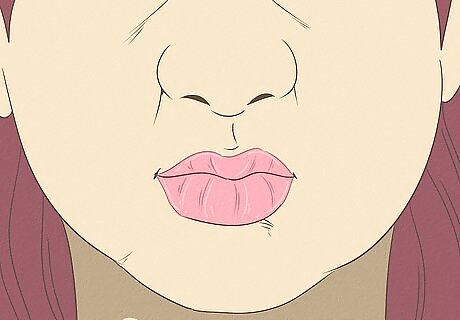
Pretend to rinse with mouthwash. Close your mouth and lightly pucker your lips. Gently move your lips from left to right as you inflate each cheek with air. It should look kind of like you’re using mouthwash. Repeat this process 10 times. Try to move your lips in the shape of a figure 8, in both directions.
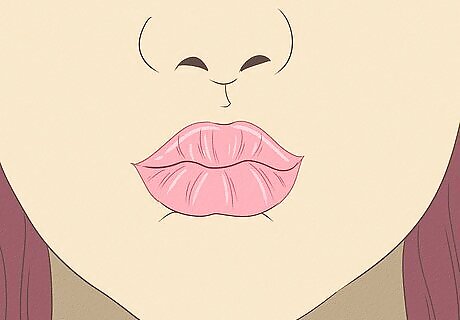
Make an exaggerated duck face. Press your lips together and lift them up toward your nose. Hold this position for 5 seconds. Repeat 10 times.
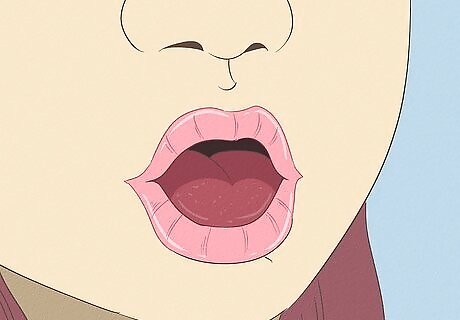
Breath out. Inhale deeply, then puff up your cheeks and form your lips into an “O” shape as you prepare to exhale. Exhale gradually, taking 2 to 3 blows to get all of your air out.
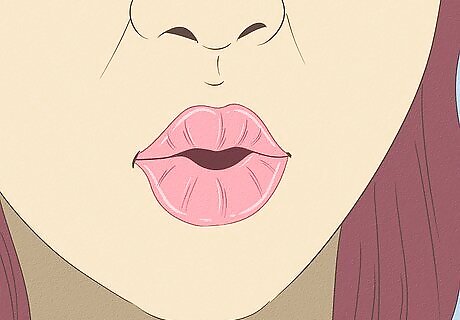
Pretend to blow out a candle. Do this in an exaggerated motion, stretching your lips out as far as you can. Relax your lips and repeat 5 times.
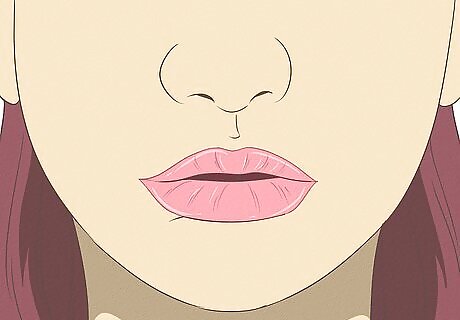
Take a break. If your mouth, face, or lips become sore from these exercises, take a break. As with any muscles, the muscles in your face can become fatigued; if you push your muscles too hard when they’re already tired, you might even injure yourself.
Considering Cosmetic Procedures
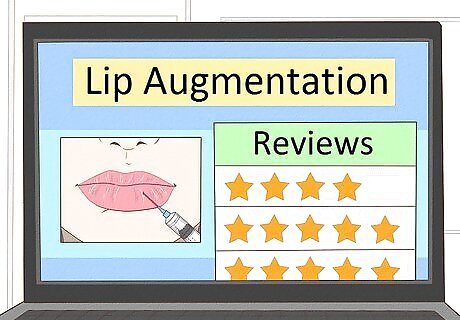
Think before you buy. If you’re determined to have bigger lips and nothing else is giving you the results you want, it may be time to look into lip augmentation. Before choosing lip augmentation, read about the different methods, read online reviews and personal experiences, and consult a few different doctors. Because lip augmentation is a relatively short and non-invasive procedure it may be tempting to make the decision lightly. As with any cosmetic procedure, however, it’s a decision that needs to be well thought out, as it can have lasting effects on your health and appearance.
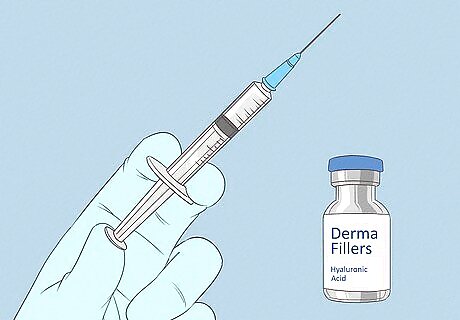
Know what lip augmentation is. Lip augmentation usually involves the injection of a dermal filler into your lips and around your mouth. The most commonly used dermal fillers today contain substances similar to hyaluronic acid, which occurs naturally in your body. Collagen was once the most common dermal filler, but it is no longer the No. 1 choice as there are now safer and longer-lasting options. Fat grafting involves transferring fat from one part of the body to the lips through liposuction. It requires a longer healing time than other methods, as it is the most invasive.
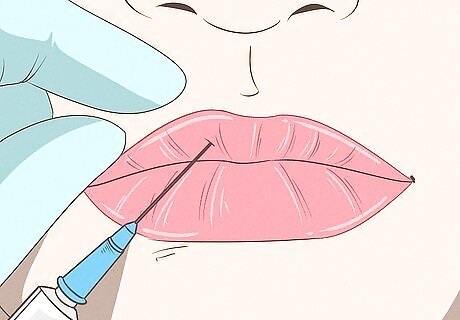
Know what lip augmentation involves. Augmentation is a relatively quick procedure that can be completed in your doctor’s office with little to no downtime: Your lips will likely be numbed before the injections. The doctor will then mark the areas that he/she will inject before injecting them with fine needles. After the injections, ice may be applied to ease discomfort and swelling. You’ll need to avoid putting any products on your lips immediately after the procedure. Ask your doctor for advice on what’s okay to put on your lips, and when. The exception to quick lip augmentation procedures is fat injection, which requires some liposuction to remove fat from one part of your body before injecting it into your lips.
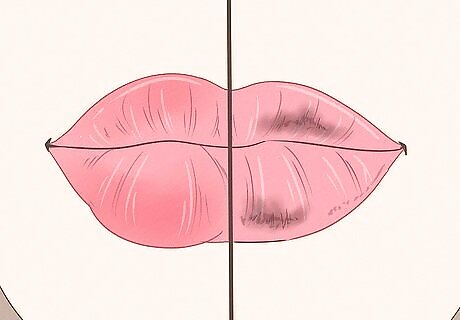
Know the risks. Hyaluronic acid fillers are unlikely to cause allergic reactions because they’re made from substances similar to those found in the body; however, reactions are still possible. Common side effects include bleeding, redness and tenderness at the injection sites, and swelling and bruising. More serious side effects include severe and prolonged swelling and bruising lasting longer than a week; lip asymmetry; lumps and irregularities in the lips; infections; and ulcers and scarring that can cause the lips to become stiff. The specific ingredients contained in your dermal filler will depend on the product used. Some contain lidocaine, which can cause an allergic reaction.
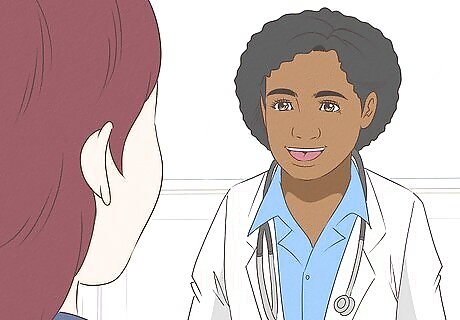
Discuss any possible allergies with your doctor. If you think you might be allergic to a filler ingredient, discuss this with your doctor before the procedure.




















Comments
0 comment